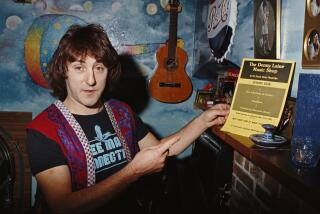Davey Graham dies at 68; trailblazing British guitarist
Davey Graham, a trailblazing British guitarist of folk and blues who influenced such performers as Paul Simon and guitarist Jimmy Page of Led Zeppelin, died of lung cancer Dec. 15 at his home in London. He was 68.
Graham’s guitar instrumental “Anji” became a standard among the coffeehouse guitarists of the 1960s. His records were rarely available in the United States, yet the song was covered on the Simon & Garfunkel album “Sounds of Silence” (1966) and in an earlier version by English folk guitarist Bert Jansch.
Although Graham was acclaimed among his peers, his eclecticism posed a marketing dilemma for record companies and booking agents. His music was not exactly folk and not exactly jazz.
Graham incorporated Asian and Indian harmonies into his compositions and often played in unconventional guitar tunings. He once termed his style “folk-baroque” because of the classical guitar techniques he brought to the folk guitar.
David Michael Gordon Graham was born Nov. 22, 1940, in Leicester, England, to a Guyanese mother and a Scottish father.
According to the London Independent, it was his loss of sight in his right eye after he fell on a pencil in a playground that led him to develop a remarkable memory and ear for sound. When he was 12, the newspaper said, a neighbor introduced him to the guitar, and he could play complicated music by the end of the day.
As a teenager, Graham was a member of traditional jazz bands and was tutored on the guitar by British folk singer Steve Benbow. He traveled abroad every summer, busking on the streets of Paris before returning to England to perform in folk clubs.
In 1959, Graham’s guitar work gained wide exposure when he appeared in a segment of the BBC-TV arts series “Monitor” directed by Ken Russell, about the guitar’s popularity among English youth.
Graham was shown gradually drawing a crowd while playing guitar in a run-down and gutted building. Other performers included classical guitar prodigy John Williams and Lonnie Donegan, master of the good-time skiffle sound that combined blues and American folk influences.
In 1962, Graham’s extended-play “3/4 A.D.” included the piece “Anji,” and the album that followed the next year, “The Guitar Player,” sealed his reputation among fellow guitarists. Accompanied by a lone percussionist, Graham on folk guitar interpreted such pieces as Sonny Rollins’ “Don’t Stop the Carnival,” Dave Brubeck’s “Take Five” and the Caribbean standard “Yellow Bird.”
“Folk Roots, New Routes” (1964), a collaboration with English folk singer Shirley Collins, brought his guitar style to bear on a collection of centuries-old English and Celtic folk songs. The recording became a touchstone for such English folk groups as Pentangle and Fairport Convention.
Around this time, Graham started writing and singing compositions that incorporated Middle Eastern influences, notably the instrumental “Blue Raga.” He recorded and performed sporadically after the 1970s, preferring to travel abroad and study guitar and languages in private.
He reemerged in 2003 with a performance in the segment “Red, White and Blues” in the PBS series “The Blues.” In 2005, a BBC radio interview segment titled “Whatever Happened to Davey Graham?” prompted the reissue of his long out-of-print albums on CD. He started doing monthly concerts in London and released a CD of his own compositions, “Broken Biscuits,” in 2007.
McArdle writes for the Washington Post.
More to Read
Start your day right
Sign up for Essential California for the L.A. Times biggest news, features and recommendations in your inbox six days a week.
You may occasionally receive promotional content from the Los Angeles Times.






